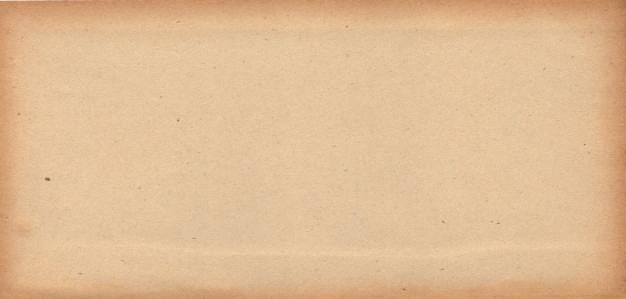
8 minute read
Daily Routine
We used to go for nature walks and things like that. … You maybe got out to Struell Wells. You walked out there and you brought your milk. Each person brought their own milk and you would have took your lunch out there and walked round the well and identifi ed birds and nests and things like that. Beside the school there was a swamp, marshes. We used to go out in the summer time and get the tadpoles. We would have brought them back to school and in Brother Raphael’s classroom and then they would have turned into frogs and he would then have put them outside. George Ca rey






At the end of the corridor there were these big books … they were gospel stories and they were all on a big string hanging on a coat stand or something. Inside they were lovely. Th ey looked like paintings but they were on like a linen background … great stories and the colours were quite vivid. Everybody sat down and listened to the story.
Kate Hanna




Th ere was just an ink well on your desk and a pen with a nib on it and pencils.
Rita Gamble, Millisle Primary School
We had assembly every day I think, from what I can remember. We had prayers and all stood in our lines and there were big hymn books that were given out. We all sang the hymns and the teacher played the piano.
Gemma Vaughan

Th e subjects you would have covered were generally the same. Every morning when you came in you did your spellings and your times tables. You had to know them. Every morning you were tested on them. You did your English work, your comprehension, some diffi cult passages and poetry. Prose, stories and maths, would have been in the morning time. In the aft ernoon it would have been some science, geography, history ... we always looked forward to PE. We would have had PE maybe twice a week.
Paul Gilchrist

DAILY ROUTINE 11
I can remember having a wee suitcase, a wee brown suitcase and that was what I carried my stuff in. You probably had the reading book home with you and your homework book and then they came back when you were fi nished with them. We maybe even shared sometimes because we didn’t have enough. Mary Lowry, Millisle Primary School brown suitcase and that was what I carried my home with you and your homework book and then they came back when you were fi nished with them. We maybe even shared sometimes


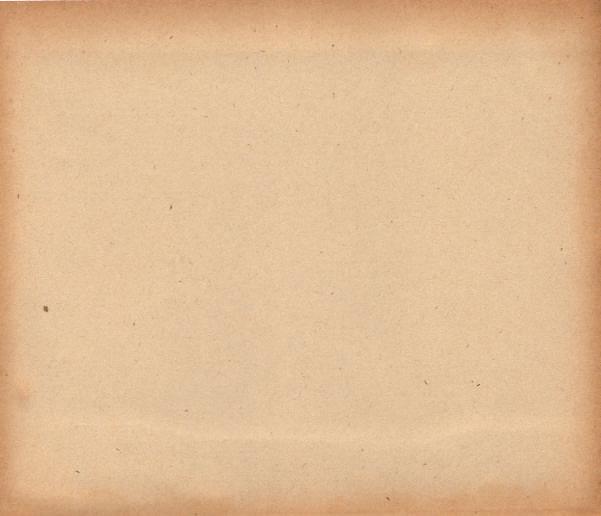


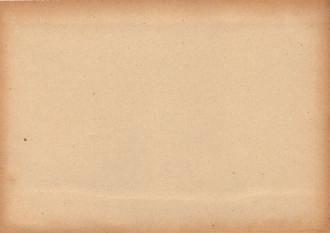
It was the highlight of your day if you got cleaning the blackboard with the wooden duster. But if it was really bad you would have got a wee bucket of water and washed it down with a cloth.
Bobby Skillen
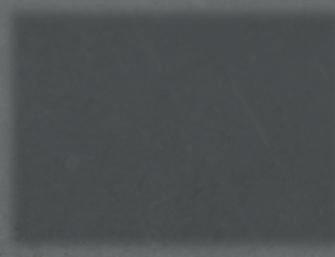
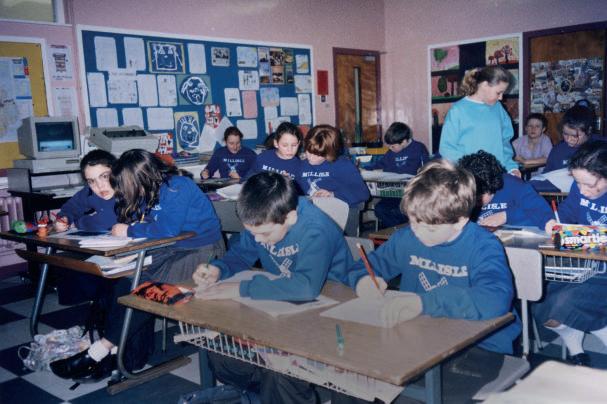

Hard at work in the classroom, 1982 Millisle Primary School I can remember that I just really enjoyed his classes (Mr. Walker). He just made them come alive you know and he really took an interest. I can remember that it was either once or twice a week we listened to the schools’ programmes on the radio. Th en it was a big sort of wooden frame but with a wee round mesh speaker in the middle and at a set time, we would have listened to that. We didn’t have ways to record it then so you had to listen to it at the time. We learnt that the letters of Belfast all stood for an industry in Belfast
B for biscuits,
E for engineering,
L for linen,
F for factories
S for ships
T for tobacco
Mary Lowry, Millisle Primary School


Mr Walker when we started was very, very big on dictionary work. You had your sheets made out and you had to fi nd the words in the dictionary and learn the meanings of the words and how to spell and how to pronounce them. Aft er that you were given a reading sheet maybe once a month and you had to learn and recite or say back to the teacher the words that you knew.
Gillian Mc Gimpsey, Millisle Primary School
I liked the I.C.T. work with Mr Maginnis. I loved the P.E. and the topics. I liked Art, a bit of Science and History. The topics I liked were fl ight in nature, Vikings, Egypt, and Victorians. Mr Maginnis helped us organise ourselves.

Tom Martin, Downpatrick Primary School
12 DAILY ROUTINE


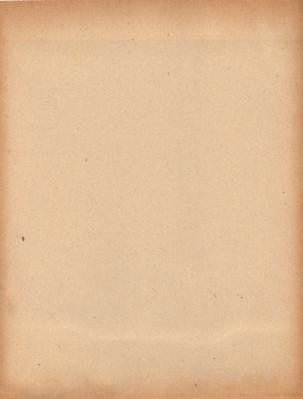

Mr Walker and class, 1968 Millisle Primary School
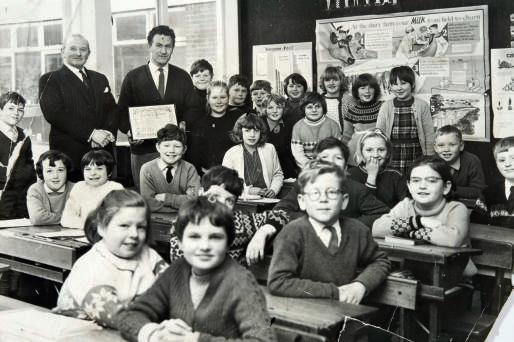

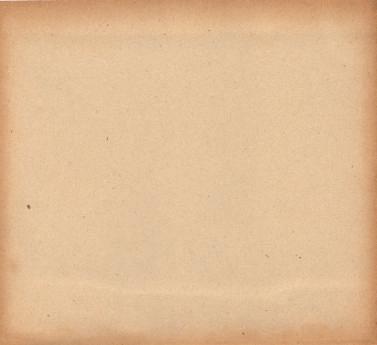

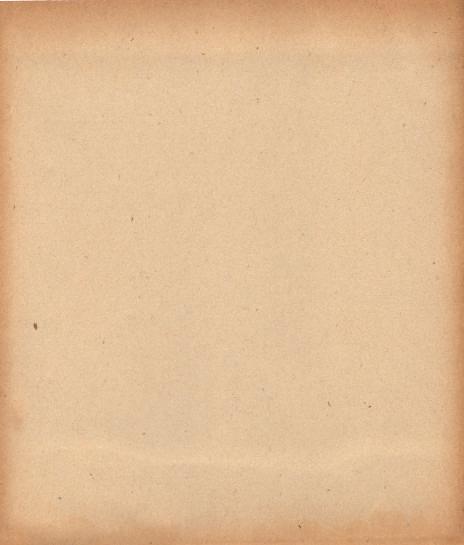

I remember one of the Chestnutts. I remember her making baby doll pyjamas. I remember Lindsay in her baby doll pyjamas. Pants and the loose top. You always associated things with certain children, I suppose. Sewing was quite involved. You know there was a syllabus for the sewing and there would have been a syllabus for sewing and knitting for quite a number of years.
Anne Ferguson
In Downpatrick primary, we did change teachers, we went to the P1 teacher who was Mrs. Ferguson, and she taught us to do sewing and knitting. I can remember one day in her class, we were all sitting round the tables and I don’t know why, but we started to throw the wool at one another. It got all tangled up and Mrs. Ferguson was not pleased. Rosemary Ferguson, Inch Primary School and Downpatrick Primary School



I suppose during my teaching days one important thing was to give children experiences. I wonder do any of the past pupils remember. I brought a bantam hen in. I had a quiet room off my room over in the primary school and I kept the bantam hen in there. So I got eggs from the lady who loaned me her bantam hen. But we brought out the eggs and the chicks and that was a wonderful thing. Th ere was so much writing and storytelling all around that. Rosie was the fi rst one and that was brought into the classroom every morning with a couple of sods. I can still remember the silence when we listened for the chicks tapping on the shell. I can still feel the sounds I suppose. It was a great time. And then we kept them you know for a certain time in a little run, and then I took them home.
Anne Ferguson
I suppose I can visualise the room better and the teacher. Th e teacher sat up on a raised platform to the side of the classroom. Th e fi re in the classroom would have been up at the front as well. She would have had P5 to P9 in those days because the children would have been up to age 14 in the school.
Anne Ferguson, Pupil and teacher in Southwell School, Teacher in Downpatrick Primary School
To go for your dinner you had to walk from the Southwell School through down to the lower fl oor of the church hall in Church Street for our lunch. And Mr. Th ompson the butcher had the contract with central meals kitchen in Church Street to deliver the dinners round all the diff erent schools. Th ey delivered to Southwell Boys, Southwell Girls that was in the same building but their classroom was up the stairs in the church hall, and also the Back Lane which is now the Presbyterian Church hall... Th e dinners were lovely... the ladies in the new primary were a Mrs. McCoubrey and Mrs. Magennis. And because I was a lovely big fella I always got seconds before anybody else got them. Bobby Skillen
DAILY ROUTINE 13










